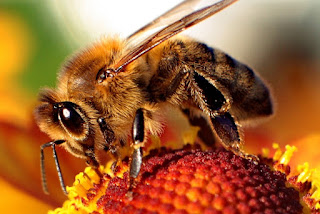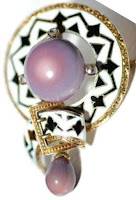Milk and Honey
Contributed by: Doug Batchelor
An Amazing Fact!
 To
produce about one pound of honey, bees must make 25,000 trips between their hive
and the flowers from which they gather the precious nectar. Furthermore, that
same pound of honey contains the essence of about two million flowers!
To
produce about one pound of honey, bees must make 25,000 trips between their hive
and the flowers from which they gather the precious nectar. Furthermore, that
same pound of honey contains the essence of about two million flowers!
"For every one that useth milk is
unskillful in the word of righteousness: for he is a babe." Hebrews 5:13 .
In
a prophecy speaking of Christ, Isaiah says, "Butter
and honey shall he eat, that he may know to refuse the evil, and choose the
good." Isaiah 7:15 .
This Scripture emphasizes that the richest of God's teaching would be in Jesus'
mouth. One of the last things Jesus did
before ascending to heaven was to eat honeycomb in the presence of the
apostles; then he explained the scriptures to them. Luke
24:42-51
An Amazing Fact!
 To
produce about one pound of honey, bees must make 25,000 trips between their hive
and the flowers from which they gather the precious nectar. Furthermore, that
same pound of honey contains the essence of about two million flowers!
To
produce about one pound of honey, bees must make 25,000 trips between their hive
and the flowers from which they gather the precious nectar. Furthermore, that
same pound of honey contains the essence of about two million flowers!
The
phrase "milk and honey" is mentioned over 20 times in the Bible, not
to advocate an extravagant diet, but rather to describe the rich abundance of
the land of Canaan. God used this phrase
primarily to emphasize that the region of Canaan was a land lush with natural
resources. To produce an abundance of milk or honey, there must be fields
covered with flowers for the bees and plentiful vegetation for the goats and
cattle. Describing the Promised Land as a land flowing with milk and honey was
more than just a metaphor. Ancient Israel was not always the dry desert we see
today. But as a result of being
conquered by a parade of empires and deforested for 3,000 years, the soil and
climate has been drastically altered.
When the Lord first delivered the Promised Land to the Israelites, the earth was so rich and fertile that the Bible tells us the bee hives and cattle utters were overflowing with abundance. The 12 men who first spied out the land said, "We came unto the land whither thou sentest us, and surely it floweth with milk and honey; and this is the fruit of it." Numbers 13:27. Now all the people of the land came to a forest; and there was honey on the ground. And when the people had come into the woods, there was the honey, dripping; 1 Samuel 14:25, 26 [NKJV]
When the Lord first delivered the Promised Land to the Israelites, the earth was so rich and fertile that the Bible tells us the bee hives and cattle utters were overflowing with abundance. The 12 men who first spied out the land said, "We came unto the land whither thou sentest us, and surely it floweth with milk and honey; and this is the fruit of it." Numbers 13:27. Now all the people of the land came to a forest; and there was honey on the ground. And when the people had come into the woods, there was the honey, dripping; 1 Samuel 14:25, 26 [NKJV]
There
are many interesting things to learn from the Bible about the use of the words
milk and honey, but the most important illustration we see is the symbolism of
the terms "milk" and "honey" in Scripture to represent the
sweet, rich truth of God's Word. Here are a few examples:
"The
statutes of the Lord are right, rejoicing the heart; The commandment of the
Lord is pure, enlightening the eyes; ...more to be desired are they than gold,
Yea, than much fine gold; Sweeter also than honey and the honeycomb." Psalm
19:8-10.
Ezekiel
3:3, 4 “And He said to me, ‘Son of man, feed your belly, and fill your stomach
with this scroll that I give you.’ So I ate, and it was in my mouth like honey
in sweetness. Then He said to me, ‘Son of man, go to the house of Israel and
speak with My words to them.’”
"As
newborn babes, desire the sincere milk of the word, that ye may grow
thereby." 1 Peter 2:2 .
"How
sweet are Your words to my taste, sweeter than honey to my mouth!" Psalm
119:103.
In
the Song of Solomon, the bride of Christ (His church) is portrayed as having
His milk and honey in her mouth, meaning that she drinks frequently from His
word. "Your lips, O my spouse, drip
as the honeycomb; Honey and milk are under your tongue." Song of
Solomon 4:11. Notice she does not
just swallow it, but holds the word in her mouth, under her tongue to enjoy and
savor the flavor. This is representative of how believers should long to relish
and meditate on the Word.
“Then
said Jonathan, …see, I pray you, how mine eyes have been enlightened, because I
tasted a little of this honey.” 1 Samuel 14:29
Friend,
are you spending time every day in God’s word?
“Oh, taste and see that the Lord is good!” Psalm 34:8.




Comments
Post a Comment